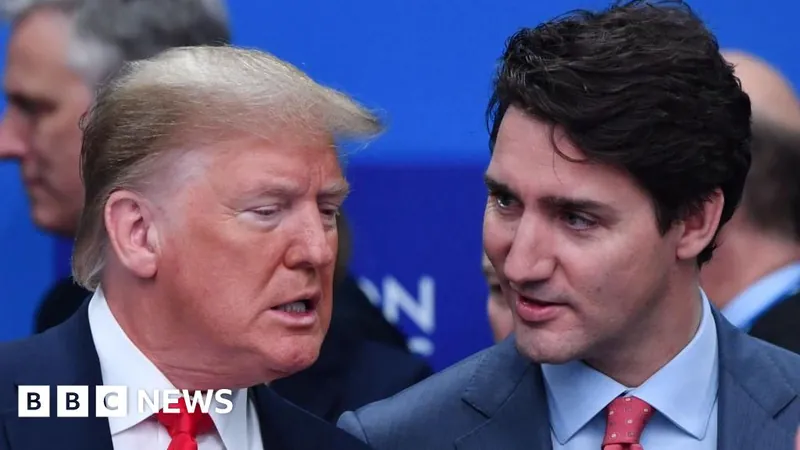
Canada, Mexico, and China Brace for Economic Fallout from Trump's Tariff Threats
2024-11-27
Author: Michael
Introduction
In a startling announcement that has ruffled economic feathers across North America and beyond, officials from Canada, Mexico, and China have reacted strongly to U.S. President Donald Trump's pledge to impose sweeping tariffs on these major trading partners. The proposed tariffs—25% on goods from Mexico and Canada and an additional 10% on imports from China—are intended to combat illegal immigration and drug trafficking, Trump claimed.
Mexico's Response
Mexico’s President Claudia Sheinbaum, newly inaugurated, warned that such tariffs could trigger retaliatory measures, jeopardizing their interconnected economies. "To one tariff will follow another, putting our common businesses at risk," Sheinbaum stated, indicating Mexico's readiness to respond with its own set of tariffs on U.S. imports.
Canada's Perspective
In a subsequent conversation, Canadian Prime Minister Justin Trudeau expressed his concerns and discussed possible responses, emphasizing cooperation over confrontation. Trudeau noted the relatively low number of migrants crossing from Canada, which differs greatly from the U.S.-Mexico situation, effectively calling for a more nuanced approach to border security.
China's Reaction
China’s reaction came swiftly. A spokesperson for the Chinese embassy labeled tariffs as detrimental to both nations, insisting that no one emerges victorious from a trade war. Liu Pengyu highlighted that China does not permit the smuggling of chemicals like fentanyl into the U.S., countering claims that China facilitates drug trafficking.
Economic Interconnection
The warning from Canada and Mexico comes as a direct response to Trump’s potential policies set to take effect on January 20. Central to their arguments is the interconnected nature of their economies with the U.S. Canada was responsible for approximately $437 billion in U.S. imports in 2022 and sent around 75% of its total exports to the United States. Deputy Prime Minister Chrystia Freeland emphasized the critical nature of Canadian exports, stating, “The things we sell to the United States are the things they really need,” which include oil, electricity, and essential minerals.
Provincial Leaders' Concerns
Moreover, several Canadian provincial leaders have hinted at imposing their own tariffs in retaliation, a move that could lead to a tit-for-tat economic standoff. Ontario Premier Doug Ford critiqued the comparison to Mexico as “insulting,” emphasizing the potential devastation to jobs on both sides of the border. The sentiment was echoed across various provincial leaders, who also raised alarm about the broader ramifications for workers in both countries.
Market Reactions
As markets reacted to these looming tariff threats, the Canadian dollar, known as the Loonie, plummeted to its lowest since mid-2020. Similarly, the Mexican peso suffered a decline, falling to its weakest value for the year, highlighting the immediate financial impacts of Trump's proposal.
Potential Economic Fallout
In the shadows of these escalating trade tensions lies a significant concern: while the rhetoric heats up, the prospect of a trade war looms ominously. Economists caution that such conflicts could lead to decreased trade, higher costs for consumers, and disruptions across numerous industries. Both Canadian and Mexican officials have reiterated the importance of constructive dialogue, asserting that behind the numbers are real people whose livelihoods could be jeopardized by misguided policies.
Conclusion
As these nations prepare for what could be a tumultuous new chapter in U.S.-trade relations, the question remains: can diplomacy prevail over tariff threats, or are we on the brink of an economic quagmire? The coming weeks will unveil the strategies these nations employ to shield their economies from potential fallout.









 Brasil (PT)
Brasil (PT)
 Canada (EN)
Canada (EN)
 Chile (ES)
Chile (ES)
 España (ES)
España (ES)
 France (FR)
France (FR)
 Hong Kong (EN)
Hong Kong (EN)
 Italia (IT)
Italia (IT)
 日本 (JA)
日本 (JA)
 Magyarország (HU)
Magyarország (HU)
 Norge (NO)
Norge (NO)
 Polska (PL)
Polska (PL)
 Schweiz (DE)
Schweiz (DE)
 Singapore (EN)
Singapore (EN)
 Sverige (SV)
Sverige (SV)
 Suomi (FI)
Suomi (FI)
 Türkiye (TR)
Türkiye (TR)